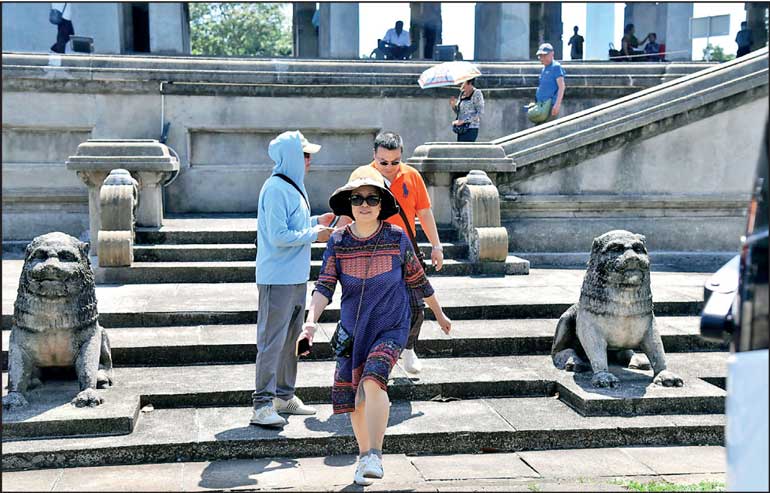Thursday Feb 19, 2026
Thursday Feb 19, 2026
Saturday, 18 March 2023 01:05 - - {{hitsCtrl.values.hits}}
 Tourism appears to be the immediate silver lining for the services sector amidst the continuing struggle by the economy. Here Chinese tourists at the Independence Square yesterday – Pic by Pradeep Pathirana
Tourism appears to be the immediate silver lining for the services sector amidst the continuing struggle by the economy. Here Chinese tourists at the Independence Square yesterday – Pic by Pradeep Pathirana
Hot on the heels of the worst ever contraction of 7.8% in 2022, the economy’s struggle is persisting and recovery remains most challenging judging by the latest update from the Purchasing Managers Indices.
The February PMIs for both manufacturing and services activities reflect further contraction reinforcing the view that the confidence factor is far from being restored despite multiple Government efforts to stabilise and spur economic growth. Other analysts opined that the macro and policy environment in the first two months of the new year weren’t conducive to stimulating the economy.
The Manufacturing PMI recorded an index value of 42.3 in February its compiler Central Bank (CBSL) said, and added it indicated a continued setback in manufacturing activities on a month-on-month basis.
This setback was driven by subdued performance observed in new orders, production, employment and stock of purchases, CBSL said.
It said the decline in new orders and production was mainly driven by subdued demand observed in the manufacture of food and beverages, and textile and clothing apparel sectors. Many respondents representing the food and beverages sector mentioned that the decline in demand was mainly due to deterioration of purchasing power of the consumers.
However, CBSL said, they expect demand to increase on a month on month basis, targeting the festive season in April.
Further, many manufacturers mentioned that the latest round of electricity tariff hike adversely affected their cost structure.
Employment and stock of purchases also continued to decline in line with the decline in new orders and production. It was observed that the manufacturers maintained material stock inventory at a minimum level, considering subdued demand conditions and the declining trend of global commodity prices, freight and exchange rates. Further, suppliers’ delivery time remained unchanged at the previous month’s level.
Expectations for manufacturing activities for the next three months indicated an improvement, anticipating an increase in demand and production targeting the upcoming festive season, despite the adverse impact of the decline in disposable income.
The services sector PMI, CBSL aid, dropped to an index value of 48.7 in February indicating a deterioration across the services sector. This was driven by the declines observed in new businesses, business activities, employment and backlogs of work.
New businesses declined in February compared to January, particularly with the decreases observed in transportation, insurance and postal and courier sub-sectors. Business activities in the services sector declined in February after six months of continuous growth. Accordingly, business activities related to wholesale and retail trade sub-sector continued to deteriorate amid subdued consumer demand driven by diminishing purchasing power. Further, the transportation sub-sector also continued to decline due to drop in freight volumes.
Meanwhile, human health, insurance and postal and courier sub sectors also showed decreases during the month. Nevertheless, the financial sector continued to improve with the improvements in deposits.
Employment continued to decline in February due to resignations, migrations and retirements occurred during the month. Meanwhile, backlogs of Work also decreased during the month in line with the reduction in new businesses.
Expectations for business activities for the next three months improved in February amid increase in tourist arrivals, upcoming festive season and expectations of greater economic stability.
Nevertheless, some respondents expressed their concerns over shrinking margins in line with high taxes and electricity tariff and subdued demand due to decline in disposable income.